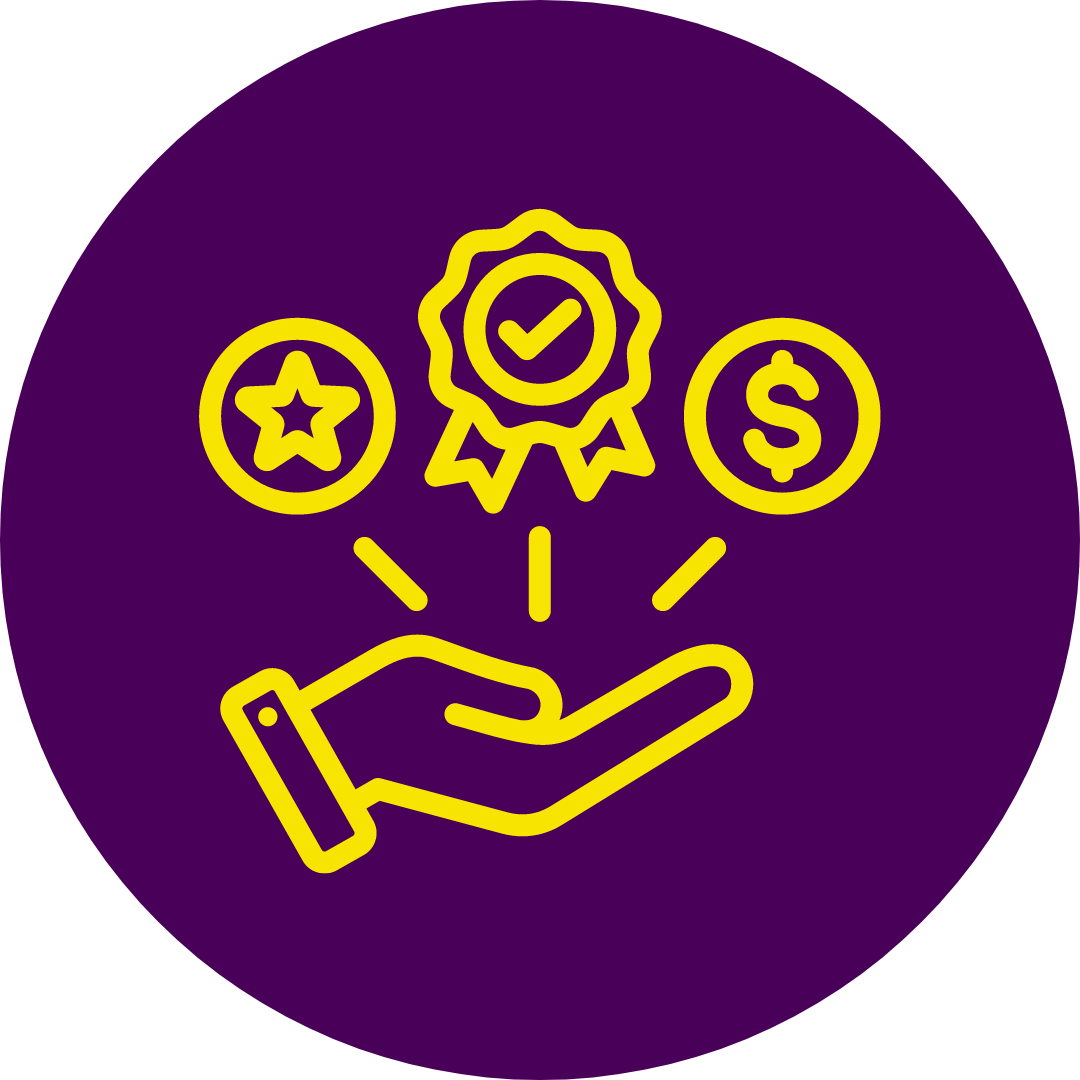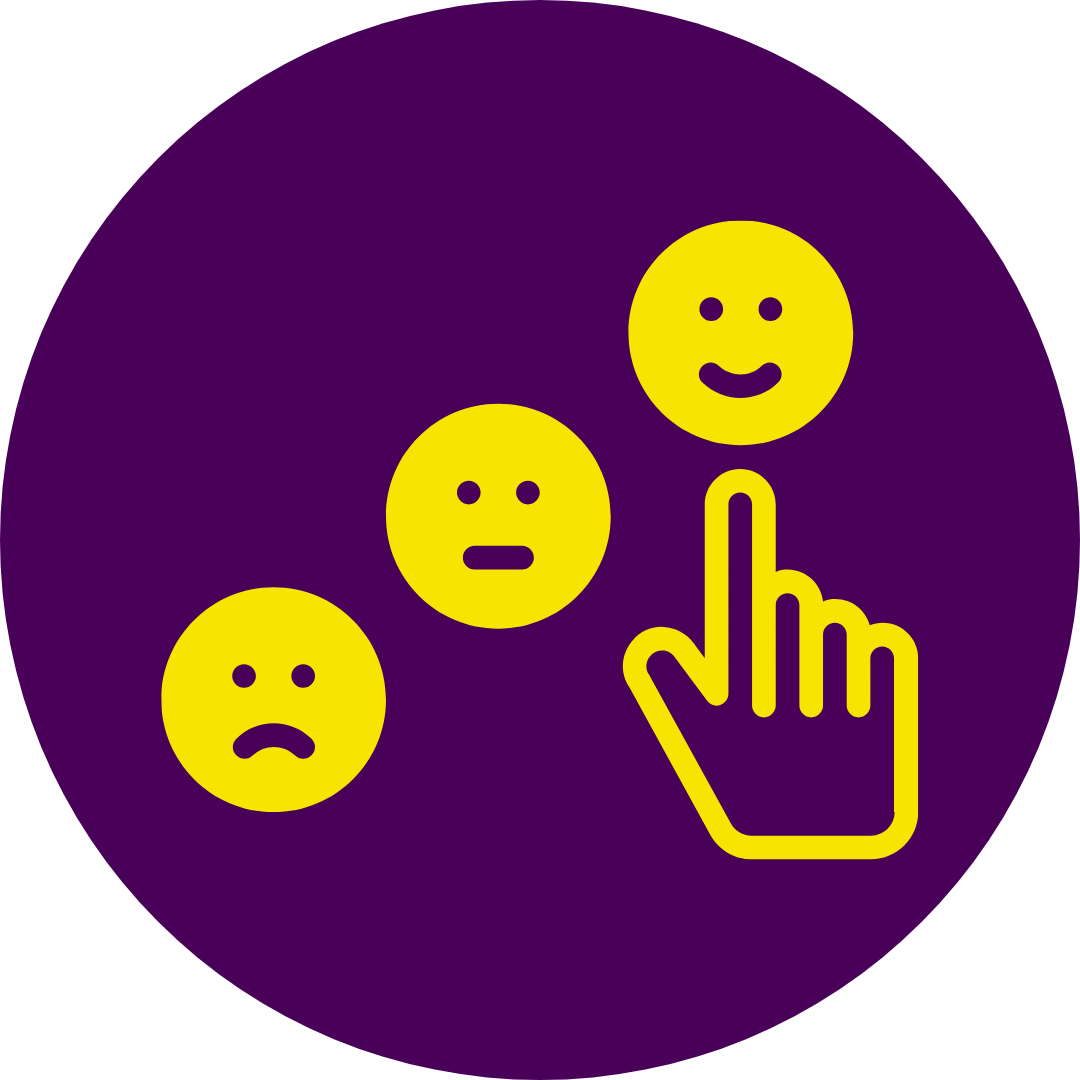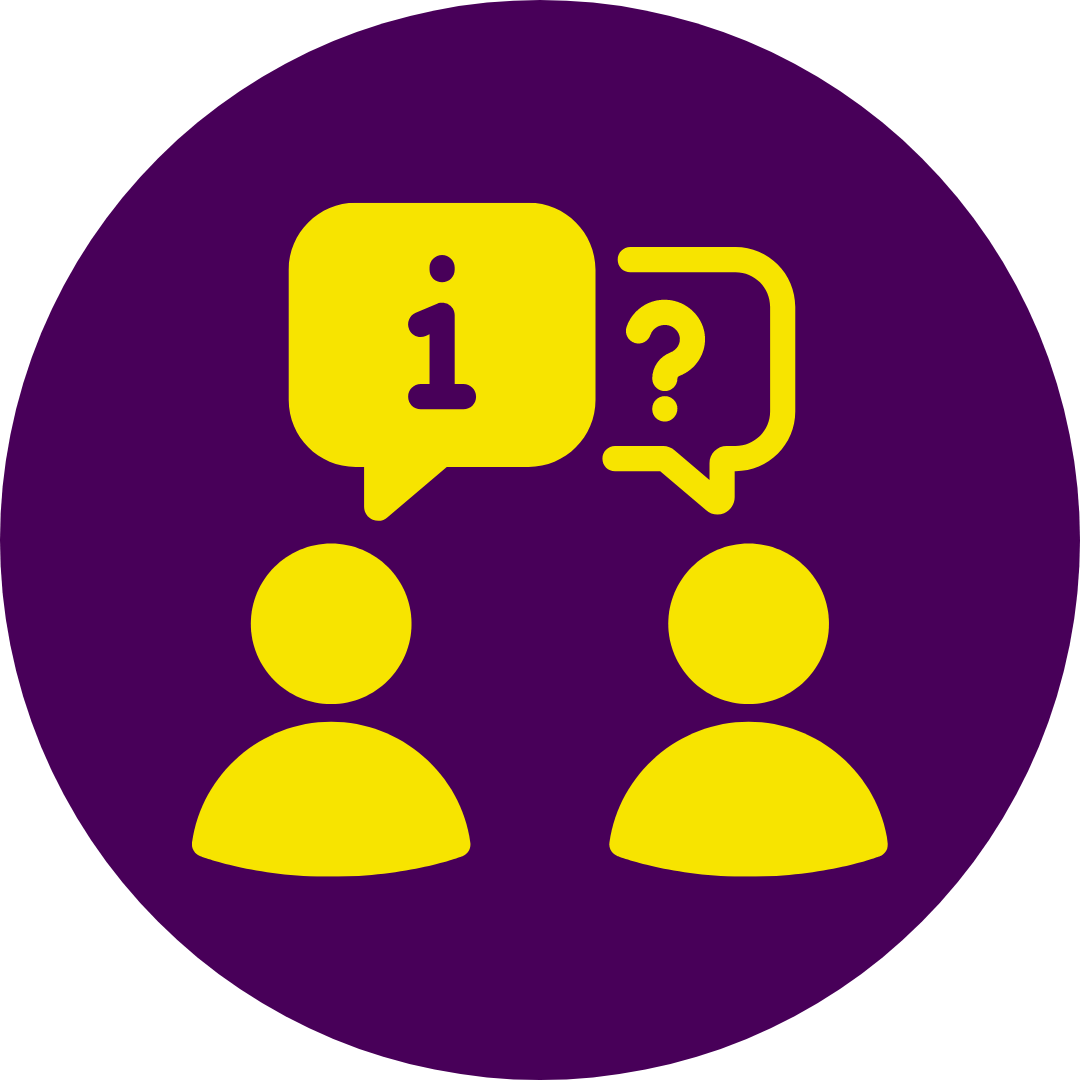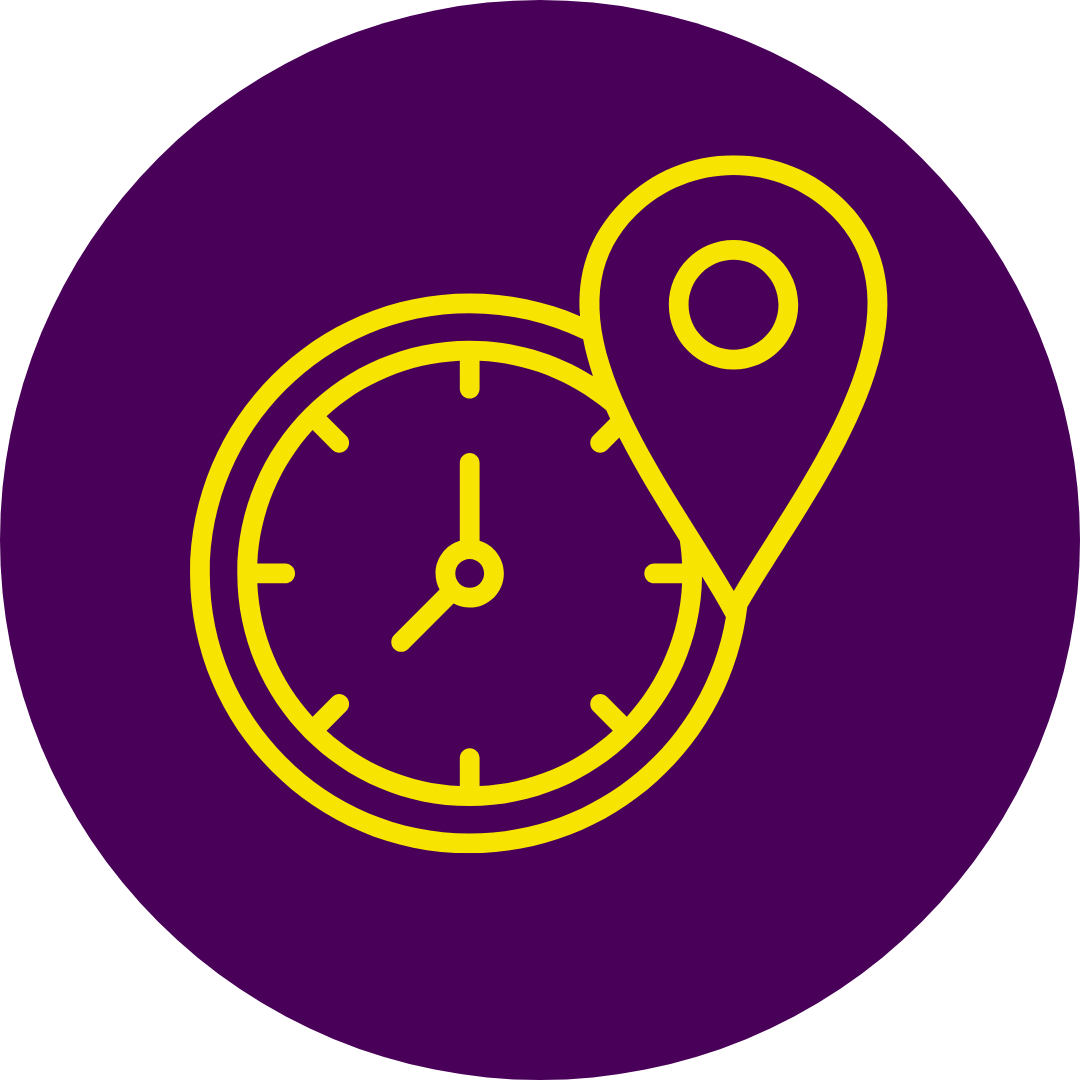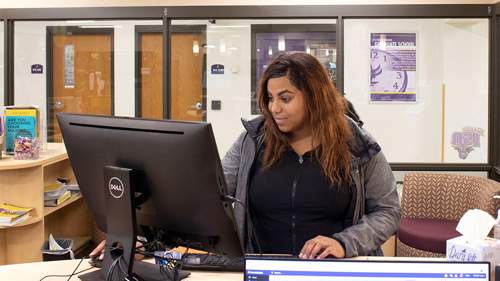Informational Interviewing
What is an informational interview?
An informational interview is a brief (20-30 minute) interview where an individual seeks information and advice from someone who has experience or knowledge in a particular:
- Field/industry
- Organization
- or job/role
The purpose of an informational interview is:
- to gain insights into a specific career path or industry
- to learn more about the day-to-day work, skills required, and potential challenges
- to build a professional network
In an informational interview, you are not asking for a job, but simply setting up a time to gain insight into what you need to do to be successful in your industry.
Reasons to be doing informational interviews:
- Jobvite's 2019 Job Seeker Nation Survey reports that even though most applicants apply for jobs on a job board or employer career site, 35% found job postings on social media, 50% of respondents heard about jobs from friends, and 37% say they also learn about jobs from professional networks. (JobVite. "2019 Job Seeker Nation Survey." Page 16. Accessed Jan. 21, 2022.)
- Employee referrals have the highest applicant to hire conversion rate – only 7% apply but this accounts for 40% of all hires (https://theundercoverrecruiter.com/infographic-employee-referrals-hire/)
- Eighty percent of professionals consider networking important to career success (https://news.linkedin.com/2017/6/eighty-percent-of-professionals-consider-networking-important-to-career-success)
Informational Interviews are designed to:
- Explore careers and clarify your career goals - If you are considering a career change or are exploring potential career paths, you might conduct informational interviews with professionals in different industries or job roles to learn more about their experiences and gain insights into different career paths.
- Discover employment opportunities that are not advertised - If you are actively searching for a job, informational interviews can be a useful tool for learning more about potential employers, getting insights into the hiring process, and making connections with people who might be able to refer you to job openings.
- Expand your professional network - Informational interviews are a great way to expand your professional network and build relationships with people in your industry or field. You can use the opportunity to ask for advice, learn about current trends and challenges, and gain insights into how to advance your career.
- Build confidence for your job interviews - Practice makes perfect. With informational interviewing, you can grow your network and interviewing skills at the same time.
- Access the most up-to-date career information - You are getting information right from the source(professionals in the field).
- Identify your professional strengths and weaknesses - If you are interested in developing new skills or advancing your existing skills, you might conduct informational interviews with professionals who have expertise in those areas. They can offer advice on how to improve your skills and suggest resources or training opportunities.
- Career exploration: College students may not have a clear idea of what they want to do after graduation. Informational interviews can be an effective way to explore different career paths and learn about the skills and experiences required for various jobs.
- Networking: Informational interviews can help college students build connections with professionals in their field of interest. These connections can provide valuable advice, support, and potential job opportunities in the future.
- Mentorship: An informational interview can be a chance for a college student to connect with a mentor who can offer guidance and advice on navigating the industry or field.
- Skill-building: Informational interviews can help students identify the skills and experiences they need to develop to succeed in their desired career. They can also provide insight into specific training or certification programs that can help students gain those skills.
- Job search: Informational interviews can be a useful tool for college students to learn about potential employers and to make connections with people who can refer them to job openings. They can also provide insights into the hiring process and how to stand out as a candidate.
- Confidence building: Conducting informational interviews can help college students build confidence in their communication and networking skills, which can be helpful in job interviews and other professional settings.
- Industry insights: Informational interviews can help students gain a deeper understanding of industry trends, challenges, and opportunities. This can help them stay informed and up-to-date as they pursue their career goals.
- Company research: Informational interviews can provide students with an opportunity to research companies they may be interested in working for. This can help them gain insight into the company culture, values, and mission, and help them determine if it would be a good fit for them.
- Real-world experience: Informational interviews can provide college students with a glimpse into the real-world of work. They can learn about the day-to-day tasks and responsibilities of different jobs, which can help them determine if a particular career path is right for them.
- Personal connections: Informational interviews can help college students build personal connections with professionals in their desired field. This can provide opportunities for ongoing mentorship and support, which can be invaluable as they navigate their career journey.
In an informational interview, you can expect to have a conversation with the interviewee about their career path, job duties, skills required for the job, and other related topics. Here are some things you can expect in an informational interview:
- Introduction: The interview will typically start with introductions, where you can briefly explain why you are interested in learning about the interviewee's career path or job.
- Discussion of the interviewee's career path: The interviewee will likely talk about their career path, including how they got started in their field, their past job experiences, and any challenges they faced along the way.
- Discussion of the job duties and skills required for the job: The interviewee will likely describe their job duties, the skills they use in their job, and the education or training required for the job.
- Advice and insights: The interviewee may offer advice and insights on how to break into the industry or how to succeed in the job. They may also provide guidance on how to gain the necessary skills and experience for the job.
- Q&A: You will have an opportunity to ask questions and clarify any points that the interviewee made during the conversation. This can be a chance to gain further insights and understand the job or industry better.
- Thank you and follow-up: At the end of the interview, it's important to thank the interviewee for their time and insights. You may also want to follow up with a thank-you note or email, expressing your gratitude for the interview and any additional insights or advice they provided.
Overall, an informational interview should be a friendly and informative conversation that allows you to learn about the interviewee's job and career path. It can provide valuable insights and advice that can help you make informed decisions about your own career path.
Interviewer:
- Prepare questions & lead the conversation: The interviewer should prepare a list of questions ahead of time that will help guide the conversation and keep it focused.
- Active listening: During the interview, the interviewer should actively listen to the interviewee's responses and take notes to help them remember important points.
- Ask follow-up questions: The interviewer should ask follow-up questions to clarify any points or delve deeper into a particular topic.
- Respect the interviewee's time: The interviewer should be respectful of the interviewee's time and keep the interview within the agreed-upon timeframe.
- Thank the interviewee: At the end of the interview, the interviewer should thank the interviewee for their time and insights.
Interviewee:
- Share their experience: The interviewee should be willing to share their experience and knowledge about their job or career path.
- Be honest and transparent: The interviewee should be honest and transparent in their responses to the interviewer's questions.
- Provide guidance and advice: The interviewee should be willing to offer guidance and advice to the interviewer based on their experience and expertise.
- Respect the interviewer's time: The interviewee should be respectful of the interviewer's time and keep their responses concise and focused.
- Provide contact information (if applicable): At the end of the interview, the interviewee should provide contact information or offer to be a resource for the interviewer if they have any additional questions or need further guidance.
Informational interviews can occur in a variety of settings, depending on the preferences of the interviewee and the purpose of the interview. Here are some common locations for informational interviews:
- In-person: Informational interviews can take place in-person, either at a coffee shop, restaurant, or another public location. This can be a good option if the interviewee is located nearby or if both parties prefer face-to-face interaction.
- Virtual: With the rise of video conferencing tools, virtual informational interviews have become more common. These interviews can take place over platforms like Zoom, Skype, or Google Meet, and can be convenient for interviewees who are located far away or who prefer to connect remotely.
- Phone: Some informational interviews may take place over the phone, which can be a good option for interviewees who prefer this method of communication or for situations where an in-person or virtual interview is not possible.
- On-site: In some cases, informational interviews may take place at the interviewee's workplace. This can provide an opportunity for the interviewee to give a tour of the workplace and provide more detailed insights into their role and the company culture.
Ultimately, the location of an informational interview will depend on the preferences of the interviewee and the purpose of the interview. It's important to be flexible and accommodating when scheduling an informational interview, and to make sure that both parties feel comfortable and safe with the chosen location.
Informational interviews can take place at any time, depending on your schedule and the availability of the person you want to interview. It's important to be respectful of the other person's time and schedule, so try to find a time that works well for both of you.
- Some people prefer to do informational interviews in the morning, before their workday begins, while others may prefer to do them during lunchtime or in the evening after work. You may also need to take into consideration time zones if you are speaking with someone who is in a different location.
- It's generally a good idea to schedule the informational interview a few weeks in advance to give both parties time to prepare and to avoid any scheduling conflicts. Once you have confirmed a time and date for the interview, be sure to follow up with a reminder a few days in advance.
- Remember that informational interviews are meant to be informal and conversational, so try to be flexible and accommodating when scheduling the interview. And if for some reason you need to reschedule, be sure to do so as soon as possible to avoid any inconvenience or misunderstandings.
Six Steps of Informational Interviewing
There are many known and unknown areas of different fields. Researching these different areas can help you more strategically conduct informational interviews. Find tools to research different careers below:
When selecting someone to do an informational interview with, there are a few things to consider to ensure that the conversation is valuable and informative:
- Relevance: The person you choose should have relevant experience or insights related to your career goals or the industry you are interested in. Consider their job title, industry, and the specific skills or knowledge they possess.
- Availability: Make sure the person you choose has the time and availability to meet with you. Be respectful of their schedule and ask for a time that works for them.
- Diversity: It's important to seek out a diverse range of perspectives and experiences. Consider reaching out to individuals who come from different backgrounds, have different career paths, or who can offer different viewpoints on the industry.
- Reputation: Look for individuals who have a positive reputation in their industry and are well-respected by their peers. You want to speak with someone who has a good understanding of the industry and can provide valuable insights and advice.
- Remember, an informational interview is an opportunity to learn and build relationships, so choose someone who you respect and admire, and who can help guide you to where you want to be in your career journey.
- Where to find people to interview?
- LinkedIn & LinkedIn groups
- Professional Articles
- Career Champions Roster- Career Champions are MSU faculty and staff members who are committed to positively impacting students’ career development in a variety of ways based on their interactions that occur as part of their everyday work
- Alumni
- Graduate Follow Up Survey- this survey can help you find organizations that have hired Mavericks so you can find someone who works at them to connect with and do an informational interview with
- Conferences/Professional Organizations
Contact the person by email or LinkedIn. Mention how you got their name and emphasize that you are looking for information, not a job. Sample Email and LinkedIn Drafts.
- Research the professional and industry/field- Remember, the point of informational interviewing is to get information you can’t just find on the internet.
- Other social medias to learn general information about the individual prior to the informational interview
- Elevator Speech- An elevator speech for networking is a brief, compelling introduction that concisely summarizes who you are, what you do, and what you are looking for in a professional context. It is called an elevator speech because it should be short enough to be delivered during the time it takes to ride an elevator, typically 30 seconds to one minute. The purpose of an elevator speech is to make a positive and memorable first impression on the person you are speaking to, and to initiate a conversation or networking opportunity.
- A typical elevator speech includes:
- Starting with a hook or attention-grabbing statement, such as a surprising fact or a question related to your field.
- Introducing yourself by name and mentioning your current or previous professional experience.
- Stating your career goal or objective, and what you are looking for in terms of networking or career opportunities.
- Ending with a call-to-action, such as asking for a business card or suggesting a future meeting or follow-up.
- Here's a template of an elevator speech, but make it your own!
- "Hello, my name is [Your Name], and I'm a [Your Major] major at [Your University]. As someone who has always been passionate about [Your Area of Interest], I've been actively seeking opportunities to apply my skills and knowledge in a real-world setting. I recently completed an internship with [Company/Organization], where I gained experience in [Skills or Projects]. I found this work to be incredibly fulfilling, and I'm eager to continue exploring opportunities in [Industry or Field]. I'm excited to connect with other professionals in the field and learn from their experiences. Thank you for taking the time to chat. Would you be willing to connect at a later time?"
- Job Search Handbook- Scroll to pg. 13
- Elevator Pitch Example- Nonprofit Management
- Elevator Pitch LinkedIn Learning
- Video About Elevator Pitch By Candid Career
- Informational Interview Question Examples
- Keep in mind that the purpose of an informational interview is to seek insights and advice rather than request job opportunities.
- Have your elevator speech (a brief introduction of yourself, including your educational and professional background) prepared.
- Plan to lead the discussion, while allowing it to progress organically, and encouraging the interviewee to do the majority of the speaking.
- Show consideration for the individual's time by adhering to the predetermined timeframe.
- Ask if it would be acceptable to reach out to them again in the future for additional inquiries.
- Ask for suggestions of other individuals to approach to obtain additional viewpoints.
- Feeling uneasy: Boost your skills and confidence by practicing with a friend or career counselor. Most people are enthusiastic about sharing information and industry insights, so ask open-ended questions and seek helpful suggestions. Don’t forget that the interviewee agreed to this interview and wants to give you information.
- Awkward silences: Prepare a list of open-ended questions that require more than a yes or no answer, and use them to keep the conversation flowing.
- Inappropriate behavior: If a contact behaves rudely or inappropriately or if you feel uncomfortable, thank them and exit the conversation early. Prioritize your safety and health over the interview.
- Long-winded responses: If you're finding the information helpful, let the contact continue. However, if it's not relevant, gently refocus the conversation by recognizing time is limited and asking another open-ended question from your list.
- Unexpected job interview: If an interview is presented to you during an informational interview, you can choose to be interviewed on the spot. However, it's appropriate to ask for more information about the job before answering interview questions. If you're not prepared, ask for more time to prepare before returning for the interview.
- Poor record-keeping: Keep track of your calls, conversations, and meetings using a spreadsheet or journal to stay organized and on top of your networking efforts.
- Frameworks can be helpful for informational interviews because they provide a structured approach for organizing your thoughts and questions. They can also help ensure that you cover all the topics that you want to discuss, and help you avoid getting sidetracked or missing important information. Furthermore, frameworks can help establish a professional and respectful tone for the conversation, as you demonstrate that you have done your research and come prepared to ask thoughtful and relevant questions. This can also help build trust with the interviewee, making them more likely to be open and candid in their responses. Overall, frameworks can help you make the most of your informational interviews and gather valuable insights and advice from experienced professionals in your desired field.
- When selecting a framework, consider:
- Will the framework help me get the information I want from the interview?
- If you do not like a framework, try a different one.
- If you will remember what the acronym stands for when in an in-person informational interview(such as a coffee chat) to guide your conversation
- Practice makes perfect. Informational interviews will become easier to prepare for and engage in the more you do them.
- TIARA Framework: TIARA stands for Trends, Insights, Advice, Resources, and Assignments. This framework involves asking questions about industry trends, gaining insights into the job or career path, receiving advice on how to break into the industry or succeed in the job, identifying resources for further learning or networking, and receiving assignments to help you gain experience or develop your skills.
- S.O.A.R. Framework: S.O.A.R. stands for Strengths, Opportunities, Aspirations, and Results. This framework involves asking the interviewee about their personal and professional strengths, the opportunities they see in their industry or job, their career aspirations and goals, and the results they have achieved in their career.
- T.I.M.E. Framework: T.I.M.E. stands for Trends, Innovations, Management, and Experience. This framework involves asking the interviewee about the current trends and innovations in their industry, their experience in managing projects or teams, and their overall experience and insights into their field.
- P.A.C.E. Framework: P.A.C.E. stands for Problems, Accomplishments, Challenges, and Expectations. This framework involves asking the interviewee about the specific problems they have faced in their career, their notable accomplishments and successes, the challenges they anticipate in their industry or job, and their expectations for the future.
- G.R.O.W. Framework: G.R.O.W. stands for Goal, Reality, Options, and Will. This framework involves asking the interviewee about their goals and aspirations, the current reality of their industry or job, the options and opportunities available, and their will or motivation to achieve their goals.
- A.R.T. Framework: A.R.T. stands for Achievements, Responsibilities, and Trends. This framework involves asking the interviewee about their professional achievements, their current responsibilities and tasks, and the trends and developments in their industry.
- C.A.R.E. Framework: C.A.R.E. stands for Career, Achievements, Resources, and Experiences. This framework involves asking the interviewee about their career path and goals, their notable achievements, the resources they use to stay informed and connected, and their experiences and lessons learned.
- F.A.C.E. Framework: F.A.C.E. stands for Feedback, Advice, Challenges, and Expectations. This framework involves asking the interviewee for feedback on your own career aspirations, advice for how to succeed in their industry or job, the challenges they face, and their expectations for the future of their career or industry.
- PASSION Framework: PASSION stands for Personal, Academic, Skills, Strengths, Interests, Opportunities, and Networking. This framework involves asking the interviewee about their personal background and experiences, their academic and professional achievements, their skills and strengths, their interests, the opportunities available in their field, and their networking strategies.
- A.C.T. Framework: A.C.T. stands for Achievements, Challenges, and Trends. This framework involves asking the interviewee about their professional achievements, the challenges they have faced in their career, and the current trends and developments in their industry.
- C.O.P.E. Framework: C.O.P.E. stands for Challenges, Opportunities, Priorities, and Expectations. This framework involves asking the interviewee about the challenges they face in their job or industry, the opportunities available to them, their priorities and values, and their expectations for their career.
- G.A.I.N.S. Framework: GAINS stands for Goals, Accomplishments, Interests, Networks, and Skills. This framework involves asking questions about the interviewee's goals, past accomplishments, interests, professional networks, and the skills required for the job.
- Questions You Could’ve learned ahead of time- what they have noted as a career path on LinkedIn, specific buzz words or terms, etc. The idea is to get information from them that you couldn’t find on your own.
- Requesting information about a controversial story related to the organization
- Asking for A Job
Send A Thank You- Within 24 hours after the informational interview, send a thank-you email to the person you spoke with. Express your gratitude for their time and insight and mention some key takeaways you learned from the conversation. This is also an opportunity to reiterate your interest in the field or industry.
- Dear [Interviewee’s Name], I just wanted to take a moment to thank you again for taking the time to speak with me about your work in [Industry/Field]. I found our conversation to be incredibly insightful and I appreciate your willingness to share your expertise and experiences with me. I plan to apply the insights you shared with me to [specific project or goal]. Thank you again for your time. Best regards, [Your Name]
- Dear [Interviewee’s Name], I wanted to take a moment to thank you for the informational interview we had earlier this week. It was incredibly valuable to hear about your experiences in [field/company/role] and gain a better understanding of the industry. Your insights into [specific topic discussed during interview] were particularly helpful, and I appreciated your candid and thoughtful responses to my questions. I feel more motivated than ever to pursue a career in this field, and I have you to thank for that. Thank you again for taking the time to speak with me. I hope we can stay in touch and perhaps collaborate on a project or two in the future. Best regards, [Your Name]
- Dear [Interviewee’s Name], I just wanted to express my gratitude for the time you took to speak with me about your experiences in [field/company/role]. It was a pleasure to meet with you and learn more about the industry from someone with such a depth of knowledge and experience. I particularly appreciated your insights into [specific topic discussed during interview], which have already given me much to think about as I continue to explore potential career paths. Thank you again for your generosity in sharing your time and expertise. I look forward to keeping in touch and hope our paths cross again in the future. Best regards, [Your Name]
Following up after an informational interview is an important step to maintain the connection and continue to build the professional relationship. Here are some tips on how to follow up after an informational interview.
Track the name and contact information of people you spoke with. Write down what you talked about and learned, what more would you like to know, and next steps you plan to take.)
- Utilize LinkedIn
- Track in a Word or Excel Document
- Create email folders around your interviews

